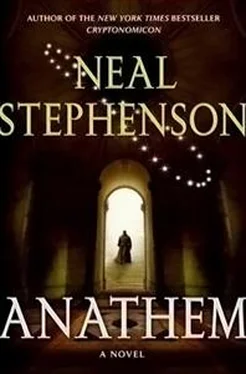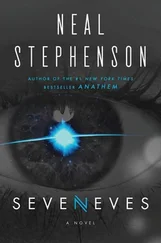“Maybe they share some of your feelings,” I suggested. “They have been doing it for a thousand years—a lot more time to get sick of it than you’ve had. You only woke up a couple of hours ago!”
“Well, that is a good point,” Arsibalt said, “but Raz, I am apprehensive that they’re not sick of it. They’ve turned it into a sort of religious quest. They come here with unrealistic expectations.”
“Ssh!” Jesry exclaimed. He was just below me. He continued, in a voice that could have been heard in all twelve Orbs, “Arsibalt, if you keep running your mouth this way, Fraa Lodoghir will have to erase everyone’s memory!”
“Memory of what?” Lio said. “I don’t remember anything.”
“Then it is not because of any Rhetor sorcery,” called out Fraa Lodoghir, “but because failed attempts at wit fade so quickly from the memory.”
“ What are you people talking about!?” demanded Yul, in Fluccish. “You’re spooking the superstars.”
“We’re talking about what it all means,” I said. “Why we’re the same as them.”
“Maybe they are weirder than you think,” Yul suggested.
“Until they let us visit Orb One, we’ll never know.”
“So go to Orb One,” Yul said.
“He’s already been there,” Jesry cracked.
We reached the bottom and climbed down an airlock-shaft just like the others and found ourselves looking straight down on the houseboat-mat of Orb Four. This had an elliptical pool of open water in the middle: a touch of luxury we hadn’t seen in any of the Laterran orbs. Perhaps the Urnudans had agriculture even more productive than the others, and could afford to waste a bit of space on decoration. The pool was surrounded by a plaza, much of which was now covered with tables.
“It is a center for the holding of meetings,” Jules explained.
My mind went straight back to Arsibalt’s complaints about the banality. The aliens have conference centers!
They had welded stairs to their sky, and painted them blue. We clanked down them, getting heavier as we went. The architecture of the houseboats below was not markedly different from what we’d seen in the Laterran orbs. There were only so many ways to build a flat-roofed structure that could float. Many of the decorative flourishes that might distinguish one style of architecture from another were buried under cataracts of fruit-bearing vines and layered canopies of orchard-trees. Our path across the houseboat complex was a narrow, but straight and unmistakable, boulevard to the elliptical pool; here, we did not ramble from one terrace to the next. Still, we did encounter the occasional Urnudan pedestrian, and as I looked at their faces I tried to resist the temptation to perceive them as mere rough drafts of superior beings from higher up the Wick. As we drew near and passed them by, they averted their gaze, got out of our way, and stood patiently in what looked to me like submissive postures.
“How much of what we’re seeing is native Urnudan culture,” I wondered out loud to Lio, who had fallen in step next to me, “and how much is a consequence of living on a military spaceship for a thousand years?”
“Same difference, maybe,” Lio pointed out, “since only the Urnudans built ships like this in the first place.”
The boulevard debouched into the plaza surrounding the meeting pool. This—as we had clearly seen from above—was partitioned into four quadrants of equal size. In turn, it was enclosed by four glass-walled pavilions that curved around it like eyebrows.
“Check out the weatherstripping on the doors!” Yul remarked, nodding at a pavilion entrance. “Those things are aquariums.” And indeed, through the glass walls we could see Fthosians, who were not equipped with nose tubes, speed-walking with documents or talking into their versions of jeejahs. “They check their breathing gear at the door,” Cord observed, and pointed to a rack just inside that heavily weatherstripped door where dozens of tank-packs had been hung up.
Jesry nudged me. “Translators!” he said, and pointed to a windowed mezzanine above the main deck of the “aquarium.” A few Fthosian men and women, fiddling with headsets, sat at consoles that overlooked the pool. And as if to confirm this, Urnudan stewards began to circulate through our delegation carrying trays of earbuds: red for Orth, blue for Fluccish. I stuffed a red one into my ear and heard in it the familiar tones of Jules Verne Durand. With a quick look around, I picked him out in the translators’ booth atop the Laterran pavilion. “The Command welcomes the Arbran delegation and requests that you gather at the water’s edge for opening ceremonies,” he was saying. I got the impression, from his tone of voice, that he’d already said it a hundred times.
We had joined up with a part of the Arbran contingent that had arrived earlier to get things sorted before the stars, journalists, and space commandos showed up to make it complicated. Ala was one of those. The Panjandrums and their aides had also preceded us, and were waiting near the water’s edge in an inflated poly bubble the size of a housing module, just off to our left as we emerged from the boulevard. Behind it was a clutter of equipment including compressed air tanks that must have been brought up on the ship from Arbre. So this was meant to be a makeshift pavilion, symbolically placing our Panjandrums on the same footing as the Geometer dignitaries. It was made of the same kind of milky poly sheeting that had covered the windows of my quarantine trailer at Tredegarh. I could make out vague shapes of dark-suited figures around a table—I thought of them as doyns—and others, servitors, hovering round the edges or darting in to handle documents.
I spent a while watching Ala run in and out of that tent, sometimes gazing off at the fake sky as she talked on a headset, other times peeling it off her head and holding her hand over the microphone as she talked to someone face to face. I was overcome by recollection of the time she and I had spent together that morning, and could not think of much else. I thought that I was like a man lame in one leg, who had learned to move about well enough that all awareness of his disability had passed out of his mind. And yet, when he tried to go on a journey, he kept finding himself back where he had started, since his weak leg made him go in circles. But if he found a partner who was weak in the other leg, and the two of them set out as companions…
Cord goosed me. I nearly toppled into the water and she had to pull me back by my bolt.
“She’s beautiful,” she said before I could get huffy.
“Yeah. Thanks. She most definitely is,” I said. “She’s the one for me.”
“Have you told her?”
“Yeah. Actually telling her isn’t the problem. You can ease up on me as far as telling her is concerned.”
“Oh. Good.”
“The problem is all of these other circumstances.”
“They are some pretty interesting circumstances!”
“I’m sorry you got swept up in it like this. It’s not what I wanted.”
“But it was never about what you wanted,” she said. “Look, cuz, even if I croak, it was a good trade.”
“How can you say that, Cord, what about—”
She shook her head, reached out, and put her fingertips to my lips. “No. Stop. We are not discussing it.”
I took her hand between mine and held it for a moment. “Okay,” I said, “it’s your life. I’ll shut up.”
“Don’t just shut up. Believe it, cuz.”
“HEY!” called a gruff voice. “What do you think you’re doing, holding hands with my girl?”
“Hey Yul, what have you been up to since Ecba?”
“Time went by fast,” he said, ambling closer and standing behind Cord, who leaned comfortably against him. “We got a lot of free aerocraft rides. Saw the world. Spent a lot of time answering questions. After three days, I laid down the law. Said I wouldn’t answer any question I had answered already. They took it hard, at first. Forced them to get organized. But after that, it was better for everyone. They put us up in a hotel in the capital.”
Читать дальше





